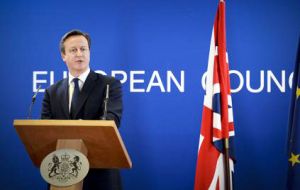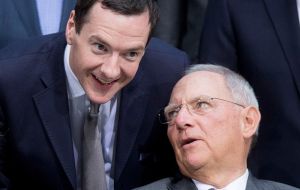MercoPress. South Atlantic News Agency
Cameron puts pressure on Europe for major changes and revamped links
 Cameron says he wants to stay in a reformed EU but has also said that he would not be heartbroken if Britain left.
Cameron says he wants to stay in a reformed EU but has also said that he would not be heartbroken if Britain left.  Germany will work with Britain to improve the EU, Finance Minister Wolfgang Schaeuble said after meeting finance minister, George Osborne, in Brussels.
Germany will work with Britain to improve the EU, Finance Minister Wolfgang Schaeuble said after meeting finance minister, George Osborne, in Brussels.  Cameron thinks national parliaments should be able to work together to block EU legislation. He also wants to limit EU influence on UK policing and justice.
Cameron thinks national parliaments should be able to work together to block EU legislation. He also wants to limit EU influence on UK policing and justice. Prime Minister David Cameron will hold an early referendum on membership of the European Union if he can first reach a deal that satisfies his demands for major changes in Britain's relationship with the bloc, his spokesman said yesterday.
Cameron, who won a majority in Thursday's general election, has pledged to renegotiate Britain's ties with Europe and then give voters an in-out referendum on EU membership by the end of 2017.
“If we can do it earlier we will,” his spokesman said when asked if Cameron would like to hold the vote earlier. The spokesman added that Cameron would seek changes to EU's basic treaties as part of the renegotiation.
The prospect of a vote on membership by the EU's second-biggest economy has worried both investors and allies, who say Britain's influence would be diminished if it dropped out of the world's biggest trading bloc.
Cameron says he wants to stay in a reformed EU but has also said that he would not be heartbroken if Britain left. Opinion polls show British voters are divided, with a little over half in favor of membership.
Since unexpectedly winning a second term, Cameron has been offered talks on reforms by European leaders but the EU executive has stressed that there can be no renegotiation of the EU's basic treaties.
But Cameron's spokesman was clear: “He wants treaty change.”
“All the advice that he has had is that treaty change is required, for example in terms of some of the changes that we want to see in welfare,” said the spokesman.
Making amendments to the basic treaties requires unanimity among all 28 states and even if such an agreement could be reached those changes would need to be ratified in each country.
Ratification would require votes in parliaments or in some cases national referendums. And France, among others, fears that it would not be able to secure a Yes vote for new EU deals in the face of mounting Euro-skeptic sentiment.
Last year Cameron set out plans to limit welfare payments to EU migrants. Some analysts believe those measures would require treaty change, though lawyers are split on the question.
Cameron wants to cut red tape emanating from Brussels, and restrict its powers. He thinks national parliaments should be able to work together to block EU legislation. He also wants to limit EU influence on British policing and justice.
The Prime Minister has thus far won limited backing from other EU leaders and while German Chancellor Angela Merkel does favor treaty change, she wants something more narrower as a way of deepening Euro zone integration.
Germany will work with Britain to improve the European Union, Finance Minister Wolfgang Schaeuble said after meeting Cameron's finance minister, George Osborne, in Brussels.
Further details about Britain's view of which reforms are needed will be set out by Cameron at a meeting of EU leaders in late June, the spokesman said.
Cameron would take the lead in negotiations, supported by Osborne, Foreign Secretary Philip Hammond and Europe minister David Lidington.
Osborne, speaking in Brussels, cautioned that allies should not underestimate Britain's determination. “We go into the negotiations aiming to be constructive and engaged but also resolute and firm and no one should underestimate our determination to succeed for the working people of Britain,” Osborne said.




Top Comments
Disclaimer & comment rules-

-

-

Read all commentsCertain people should notice differences now that the wimpish, pro-EU LibDems are out of the way. I can't say what Cameron will ask for, but I hope that it will cover the following area;
May 13th, 2015 - 09:10 am 01. The right to limit immigration. Limiting immigration is consistent with the free movement of workers. A simple precaution. Before arrival in the UK, the 'worker' must have a UK job guaranteed for 5 years. Loss of job means departure. Non-workers may not receive UK benefits in any way, shape or form. Ever. This is to include 'family' members. Given the current attempt by the EU to interfere in non-EU immigration, the UK rejects any forced quota system. Non-EU migrants to comply with similar rules to those for EU migrants. Genuine refugees and asylum seeks are separate issues. Voluntary migrants required to have an adequate command of spoken and written English. Migrant applications must be made, in person, at designated offices. Designated offices for Africa are located in Bogota, Rio de Janeiro and Sao Paulo. For Asia, designated offices are in Canberra and Christmas Ireland. For Europe, the designated offices are in Harare and Lagos.
2. The issue of welfare benefits is largely dealt with in 1. above. Genuine refugees and asylum seekers must reside where directed. Usually in camps. Movement outside camps and other facilities will be permitted except during curfew hours. Curfew hours will be the hours of darkness. Burqas and similar forms of dress are illegal.
3. Suspected or convicted criminals may not claim any form of 'human rights'.
4. As a special case, 'travellers' will be required to travel. Constantly. As a control measure, vehicle odometers will be monitored. Taxes will be levied at petrol stations. £200 per traveller every time a vehicle enters. Less than 300,000 miles per year and 'traveller' status will be revoked. Deportation within 24 hours. Two possible destinations. Ireland or scotland. In either case, vehicles to be dumped in the Irish Sea.
#1
May 13th, 2015 - 10:17 am 0Jawol mein Fuerher, or Deus Veult depending on your allegiance.
Christmas Ireland ????????????? Sounds a jolly place.
If I may be permitted to query your plan to deport people to Scotland may I ask how this will be done.
In previous posts you have either nuked the country, constructed a 10 mile channel at the border filled with mines AND built a huge wall.
This would seem to present a logistical problem for transportation.
You obviously cannot use cattle trucks as they are all needed to carry commuters to London from places such as Aldershot.
You could always use the final solution problem favoured by the third Reich ....reduce them to ashes and use it for road bottoming.
Get outa my pub, said Barbara Windsor,
May 13th, 2015 - 11:09 am 0I wonder if the European president will be saying the same to David,
get outa my Europe...
just saying like.
Commenting for this story is now closed.
If you have a Facebook account, become a fan and comment on our Facebook Page!